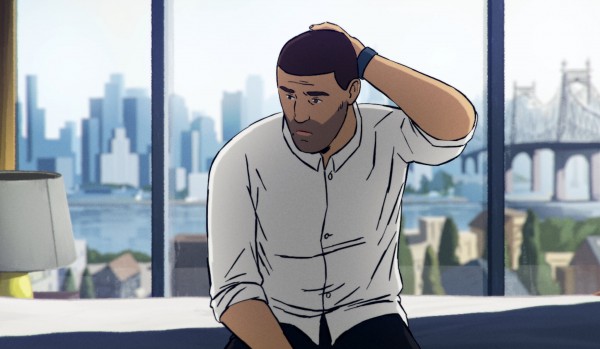-
FLEE (Jonas Poher Rasmussen 2021)
JONAS POHER RASMUSSEN: FLEE (2021)

AMIN IN NEW YORK IN FLEE
An Afghan refugee opens up about a hidden past
Even in a time when there are many films about refugees, the animated tale of Amin Nawabi (a pseudonym) makes an impression. He went through grim years hiding in Moscow with expired visas after he escaped from Afghanistan following the rise of the Taliban in 1989 with some of his family (his mother, his two sisters, and his brother), minus his father, then as a young teenager arrived alone in Copenhagen. On top of it he's gay, which seems for a while just one more problem, although, as he's telling the whole true story for the first time to a kind of therapist-filmmaker (his Danish college friend Jonas Poher Rasmussen), he's about to be married to the man of his dreams and live in a beautiful, spacious place out in the country.
Animation comes in two kinds here: there's the regular kind, and then there's a rougher, more abstract and monochromatic look for peculiarly traumatic moments. There are also period film clips shown in a small box in the middle of the screen. These are dramatizations and actors voice the animated figures, including Riz Ahmed as Amin today. Different ones voice young Amin at different ages.
What one remembers is the fact that present-day Amin is able to live as openly gay, and barely had any gay experience till he'd gone to Danish high school, for all we know; the other thing is the particularly gruesome circumstances of the escape from Russia, with several failed tries via human traffickers. Mina’s sisters and dozens of other refugees nearly die after being packed into a shipping container bound for Sweden. Another time Amin and dozens of other desperate migrants are marched through a forest in the dead of night before being stuffed inside a small boat with no radio that gets stranded in the middle of the Baltic Sea during a torrential downpour. They think a passing cruise ship is saving them but instead they're taken to Estonia, held in dire conditions , then deported back to Russia. Much later, because the eldest brother Abbas, in Sweden, on whom they depended to pay the human traffickers, made very little money working as a cleaner, it was a better trafficker who was more expensive and so only one family member could go at first, and Amin was the one chosen to go.
This led to a different, more subtle kind of pain. The trafficker did a better job. He put Amin on a plane with a fake Russian passport with another youth (whom he found charming and attractive and who gave him a gold nick chain), and after Amin got to Denmark he had to destroy the passport and declare himself a refugee - and, to avoid being sent back, to pretend all his family was dead. He had to stick to this tory, and so great was his fear of being sent back to Russia or to Kabul again, up to now he has concealed that he had living relatives. The later fate of the rest of his family is left vague. They all escaped from Moscow but instead of going to Sweden as they'd once planned they are scattered around Europe, and the father who escaped from Afghan prison in 1979, has never been heard from again.
This account, we understand, is Amin's first full and open acknowledgment, though anonymous - of this long, artificial estrangement. Till adulthood he lied about his past, so for him, this film, or the narrative it contains, is a big gesture that, from accounts, he didn't plan on but developed as he began opening up to Rasmussen. Truth and reconciliation, perhaps. He says the life he went through made it hard to trust anybody. That he seems to have a happy life now seems a remarkable accomplishment under those circumstances.
Amin's story is touching and the details of his family's ordeals as refugees are as riveting as they are horrifying. But even though this is a first-person confession, the anonymity and partial concealment of the film's mostly rather neutral animation risk leaving a generic impression, compared to good old fashioned WWII feature film sagas that make you feel like every detail is being revealed even if it's invented - or real, direct documentaries where the narrator reveals his identity and we revisit actual places and people. As Keith Watson wrote in his Flee review for Slant last September, the film winds up being "just a bit too far removed from the man himself." That's even despite the gay subplot , whose thread, though slender, does run all through the film: as a child he's seen liking to put on his sister's dresses. Amin's focus is always on his family and his refugee story, not on unfolding all his whole life. He is still guarded - revealing, yet holding back. But the refugee story is timely, the story is powerfully told, and Flee wound up on many 2021 Anglophone Best Lists and got the biggest prize of all: inclusion among the Oscar nominees in two categories: best documentary, and best animated feature film - despite it's being entirely in Norwegian, Russian and Dari.
Flee 89 mins., debuted at Sundance Jan. 2021 and is listed on IMDb in 46 other festivals, including Annecy, Toronto, Telluride, New York, and DOC NYC. Limited US release Dec. 3, 2021. Watched Feb. 9, 2022 on Google play. Metacritic rating: 91%.
Last edited by Chris Knipp; 11-12-2022 at 09:12 AM.
 Posting Permissions
Posting Permissions
- You may not post new threads
- You may not post replies
- You may not post attachments
- You may not edit your posts
-
Forum Rules





 Reply With Quote
Reply With Quote
Bookmarks